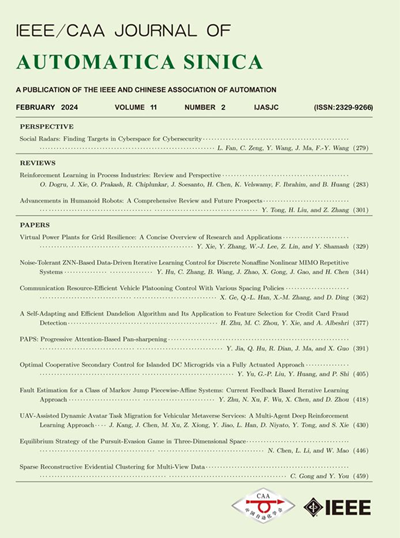Active Compression on Unknown Disturbance and Uncertainty via Extended State Observer
IF 19.2
1区 计算机科学
Q1 AUTOMATION & CONTROL SYSTEMS
引用次数: 0
Abstract
Extended state observer (ESO) is heavily limited by the unknown disturbance and its derivative, which requires high observing gains to decrease estimating error, resulting in serious noise sensitivity. To modify the disturbance estimation characteristics encountered by the observer, the active compression extended state observer (ACESO) is proposed in this study. The ACESO decreases the bound of residual lumped disturbance and its derivative by actively compressing the initial lumped disturbance, without relying on prior knowledge. The stability constraint and convergence results of ACESO are analyzed and compared with ESO theoretically. The results show that the ACESO mitigates the trade-off between noise sensitivity and high-gain observation. Benefiting from active compression, the ACESO has substantially less noise sensitivity than the ESO, while obtaining the same and even better estimating performance than the ESO. In addition, the nonlinear ACESO is discussed, which automatically balances the contradiction between estimation and convergence. Simulations and experiments demonstrate the effectiveness of the proposed methods.扩展状态观测器对未知干扰和不确定性的主动压缩
扩展状态观测器(ESO)受未知扰动及其导数的严重限制,需要较高的观测增益来减小估计误差,导致严重的噪声敏感性。为了改善观测器遇到的扰动估计特性,本文提出了主动压缩扩展状态观测器(ACESO)。ACESO通过主动压缩初始集总扰动来减小残余集总扰动及其导数的界,而不依赖于先验知识。从理论上分析了ACESO的稳定性约束和收敛性结果,并与ESO进行了比较。结果表明,ACESO减轻了噪声灵敏度和高增益观测之间的权衡。得益于主动压缩,ACESO具有比ESO低得多的噪声灵敏度,同时获得与ESO相同甚至更好的估计性能。此外,还讨论了自动平衡估计与收敛矛盾的非线性ACESO算法。仿真和实验验证了该方法的有效性。
本文章由计算机程序翻译,如有差异,请以英文原文为准。
求助全文
约1分钟内获得全文
求助全文
来源期刊

Ieee-Caa Journal of Automatica Sinica
Engineering-Control and Systems Engineering
CiteScore
23.50
自引率
11.00%
发文量
880
期刊介绍:
The IEEE/CAA Journal of Automatica Sinica is a reputable journal that publishes high-quality papers in English on original theoretical/experimental research and development in the field of automation. The journal covers a wide range of topics including automatic control, artificial intelligence and intelligent control, systems theory and engineering, pattern recognition and intelligent systems, automation engineering and applications, information processing and information systems, network-based automation, robotics, sensing and measurement, and navigation, guidance, and control.
Additionally, the journal is abstracted/indexed in several prominent databases including SCIE (Science Citation Index Expanded), EI (Engineering Index), Inspec, Scopus, SCImago, DBLP, CNKI (China National Knowledge Infrastructure), CSCD (Chinese Science Citation Database), and IEEE Xplore.
 求助内容:
求助内容: 应助结果提醒方式:
应助结果提醒方式:


